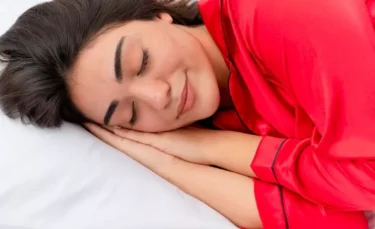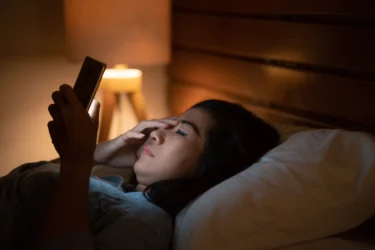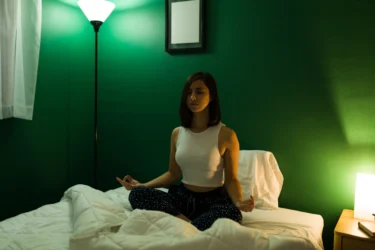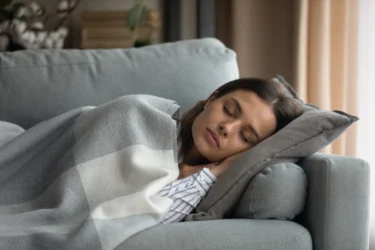Natural Home Remedies For Good Sleep
By Dr Anuja Bodhare +2 more

Get,

to manage your symptom
Get your,


4 Cr+ families
benefitted

OTP sent to 9988776655



You’ve successfully subscribed to receive
doctor-approved tips on
Whatsapp

Get ready to feel your best.

Hi There,
Download the PharmEasy App now!!


Register to Avail the Offer
Send OTPBy continuing, you agree with our Privacy Policy and Terms and Conditions

Hi There,
Sign up on PharmEasy now!!
Trusted by 4 crore+ families

OTP sent to 9988776655



You have unlocked 25% off on medicines




Code: NU25
By Dr Anuja Bodhare +2 more
Table of Contents
Could not sleep well last night and woke up feeling all cranky? We have all suffered from not getting enough sleep or insufficient sleep quality. As a result, people often search for ways to improve their sleep quality.
Adults need, on average, seven hours of uninterrupted good quality sleep each night. Quality of sleep is as essential as sleep duration. Good quality of sleep is the need of the hour. People need to get enough good sleep to live a healthy life; it should not be considered a luxury. Not getting sufficient sleep can make you more prone to many diseases and conditions1,2.

If you face difficulty in falling asleep or wake up tired even after getting plenty of sleep, you need to contact your healthcare provider and get the necessary diagnosis. Meanwhile, you can follow the home remedies mentioned below to improve your sleep quality.
Many factors can hinder your sleep and affect your sleep quality. These causes are:
Loss of sleep itself can be a symptom of some sleep disorders. It can have many effects on your health. It can also impact your immunity, nervous system, hormones and the heart3. Poor quality of sleep or getting insufficient sleep can:
If you have trouble falling asleep regularly, you might be suffering from certain sleep disorders. Common symptoms of sleep disorders are given as follows:
You can follow the home remedies mentioned below to help you sleep better. In addition, some of these natural remedies for sleep can be taken with a glass of milk before bed.

This is an easily available product. Drinking a glass of warm milk before bed may be an effective way to improve sleep quality. Milk helps to promote good sleep. So, drinking warm milk might help induce sleep4.

Chamomile tea is a herbal tea with many health benefits. The flavonoids present in chamomile tea might have various therapeutic activities. Flavonoids can interact with specific receptors in the brain and induce sleep, and hence chamomile tea is considered one of the natural remedies for deep sleep. You can drink some warm chamomile tea to help you sleep better4.

Cinnamon is present in a standard kitchen in Indian households. It is mainly used as a spice and added to various foods and dishes. This spice might be good for your health. You mix the cinnamon powder in a glass of warm milk. You can also add some honey for taste. Drinking this milk before going to bed might help you get a good sleep5.

Indian ginseng or ashwagandha is a potent medicinal herb with many valuable properties for health. Ashwagandha is widely considered one of the home remedies for sleeplessness and might be beneficial in relieving insomnia. Before going to bed, take some ashwagandha root powder with a cup of milk. You can also put some sugar for taste. Taking this mixture may help you sleep better5.

Liquorice is also known as Mulethi in Hindi. Liquorice root is a potent medicinal ingredient which might offer several health advantages. Liquorice might also be effective for dealing with insomnia. You can take liquorice root powder with a glass of warm milk before bed. It may help you have a good sleep5.

Almonds are commonly known as Badam in Hindi. They are often used in Indian cooking and are added to various desserts. They may be valuable for health and the brain. They might have a calming and soothing effect on the mind and may also help induce sleep5. You can crush a few almonds to make powder. Take this powder with a glass of warm milk before going to bed.

Developing a sleep cycle may help your body make a healthy sleep routine and rest properly. It might also enhance the quality of your sleep. You can create a sleep pattern by waking up and going to bed at about the same time every day6.

Exposure to computer screens, television screens, or mobile screens before bed can cause sleep disruption. Therefore, it is advised that you limit your screen time before bed. Your mind should relate being in bed to sleeping and not using a computer or watching TV. Also, avoid staying in bed if you feel awake6.

Dedicate a specific time before going to bed to relax. During this time, avoid thinking about tomorrow or solving any problem. Try a few relaxation techniques. Find a method that suits you. Also, refrain from using cell phones or computers during this period6.

If you have a habit of napping during the daytime, it can make it difficult to fall asleep at night. If you genuinely need to take a good nap, limit the duration to not more than half an hour. Also, avoid taking naps four hours before your designated bedtime6.
Apart from the home remedies, here are some things that you can follow to get good quality sleep:
Though there are studies that show the benefits of the given herbs and home remedies in getting good sleep, these are insufficient. There is a need for further studies to establish the true extent of the benefits of these herbs and home remedies on human health. Thus, these should be taken with caution and never as a substitute for medical treatment.
Also Read: Best Home Remedies for Snoring
You can reach out to your doctor:
You must not rely on home remedies alone to get a good sleep. You should consult a doctor for any advice on getting good sleep if the symptoms don’t improve.
To stay healthy and fit, an adult requires seven hours of quality sleep daily. Unfortunately, a busy life can make it hard for you to get enough quality sleep. But, you can follow specific tips on how to get sleep naturally and use some home remedies to improve your sleep quality. For example, making a sleep schedule and limiting your screen time before bed are some habits that may help you sleep better. Also, herbal ingredients such as Indian ginseng, liquorice, chamomile, cinnamon and almonds can be taken with a glass of warm milk to help improve sleep quality.
However, if your sleep problems interfere with your daily activities and affect how you function, reach out to your healthcare provider immediately. Also, if you face difficulty falling asleep daily, you might be suffering from some sleep disorder. In such cases, contact your doctor to get the necessary diagnosis.
Also Read: Best Home Remedies For Hangover
You can follow various home remedies such as ashwagandha, chamomile tea, liquorice, almonds and cinnamon that might help you sleep better. These can be taken with warm milk before bed to improve sleep quality4,5.
A lot of people experience trouble falling asleep on some days, but if you face this difficulty regularly and the sleep problems have started interfering with your day-to-day activities, you must contact your healthcare provider1.
Not getting enough sleep or poor sleep quality can make you feel tired and sleepy throughout the day. Try improving your sleep quality or getting sufficient sleep at night. If you experience these problems daily, contact your doctor and get medical help1.
Yes. Chamomile is valuable in improving the quality of sleep. It contains flavonoids that interact with specific brain receptors and may induce sleep. Sipping some warm chamomile tea before bed might help you sleep better4.
Essential oils like lavender, chamomile and bergamot are popular for their potential relaxing and calming properties. Diffusing them in the bedroom or adding a few drops to a bath may create a serene environment conducive to sleep.
Regular exercise can promote better sleep by improving overall health and reducing stress. Gentle exercises like yoga or tai chi in the evening can be particularly calming. However, intense exercise too close to bedtime might be stimulating for some individuals.
Many experts recommend avoiding screens from phones, tablets or computers before bed, as the blue light emitted can interfere with the body’s production of melatonin, a hormone that regulates sleep. Consider adopting a screen-free routine an hour or more before bedtime to help signal to your body that it’s time to wind down.
Creating a calming bedroom environment can significantly impact sleep quality. Consider using blackout curtains, keeping the room at a comfortable temperature, using soft and supportive bedding and eliminating noise with white noise machines or earplugs.
1. MyHealthfinder [Internet]. Get Enough Sleep; [cited 2022 Jun 10]. Available from: https://odphp.health.gov/myhealthfinder/healthy-living/mental-health-and-relationships/get-enough-sleep
2. Centers for Disease Control and Prevention [Internet]. Sleep and Sleep Disorders; 2020 Apr 15 [cited 2022 Jun 10]. Available from: https://www.cdc.gov/sleep/index.html
3. NCBI Bookshelf [Internet]. Extent and Health Consequences of Chronic Sleep Loss and Sleep Disorders – Sleep Disorders and Sleep Deprivation; [cited 2022 Jun 10]. Available from: https://www.ncbi.nlm.nih.gov/books/NBK19961/
4. Johns Hopkins Medicine [Internet]. Natural Sleep Aids: Home Remedies to Help You Sleep; [cited 2022 Jun 10]. Available from: https://www.hopkinsmedicine.org/health/wellness-and-prevention/natural-sleep-aids-home-remedies-to-help-you-sleep
5. Ayush Division [Internet]. Ayurveda offering herbal healing; [cited 2022 Jun 10]. Available from: https://esic.gov.in/attachments/publicationfile/7d11b02e5abb4717d53b4ce05efabd21.pdf
6. Healthdirect [Internet]. Sleep – stages, tips, disorders, apnoea; [cited 2022 Jun 10]. Available from: https://www.healthdirect.gov.au/sleep
Disclaimer: The information provided here is for educational/awareness purposes only and is not intended to be a substitute for medical treatment by a healthcare professional and should not be relied upon to diagnose or treat any medical condition. The reader should consult a registered medical practitioner to determine the appropriateness of the information and before consuming any medication. PharmEasy does not provide any guarantee or warranty (express or implied) regarding the accuracy, adequacy, completeness, legality, reliability or usefulness of the information; and disclaims any liability arising thereof.
Links and product recommendations in the information provided here are advertisements of third-party products available on the website. PharmEasy does not make any representation on the accuracy or suitability of such products/services. Advertisements do not influence the editorial decisions or content. The information in this blog is subject to change without notice. The authors and administrators reserve the right to modify, add, or remove content without notification. It is your responsibility to review this disclaimer regularly for any changes.
Comments

Leave your comment...
You may also like
Comments